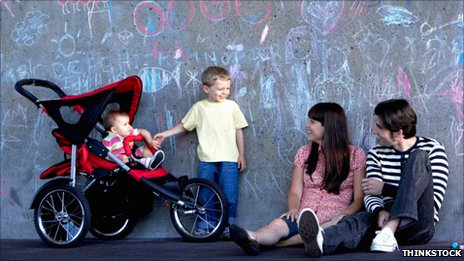LANGUAGES WITH NATIVE SPEAKERS
BY PHONE, SKYPE, MSN OR YAHOO MESSENGERS, GOOGLETALK OR QQ
PARENTAL SPENDING CRAZE
Discussion
Look at the title of the text below. What can it be about? What’s the meaning of the word ‘craze’? Try to give a definition and remember some words that have the same root.
Reading
Below you will find an abstract from a BBC article. Read it, answer the questions and express your attitude.
The parental spending craze
By Vanessa Barford BBC News
Parents have always felt the pressure to provide for their children, but for some the cost of parenting is proving more expensive than ever – and it's not just down to traditional economics.
With childcare costs going through the roof, education expenditure increasing and university tuition fees at record levels, it is no wonder some parents are feeling the financial strain of parenthood.
Insurer LV estimates that the cost of raising a child to the age of 21 now totals more than £210,000 – up 50%, or by £70,450, since 2003.
Official organisations tend not to keep data on how much parents spend on their children. But anecdotal evidence suggests that escalating costs are partly down to the fact that some parents, and not just the wealthy ones, are willing to fork out more on fashionable accessories.
 The fact that parents are under pressure to buy the latest products and gadgets is an age-old story. But the competition between parents to have the best baby accessories appears to have increased over the past few years. For instance, nearly one fifth of parents of children aged 0-4 years have bought a television for their baby's bedroom, rising to 28% of parents of children aged 15-24.
The fact that parents are under pressure to buy the latest products and gadgets is an age-old story. But the competition between parents to have the best baby accessories appears to have increased over the past few years. For instance, nearly one fifth of parents of children aged 0-4 years have bought a television for their baby's bedroom, rising to 28% of parents of children aged 15-24.
Is it, as some experts suggest, partly to do with the fact that some parents are increasingly seeing children as a statement of themselves?
As such, some baby goods have been recast as status symbols and nowhere is this better reflected than the pram, pushchair and buggy market. This has seen a 13% rise in spending between 2008 and 2010 and now accounts for 30% of all spend on baby and nursery goods.
Question section
- What’s the main point of the article?
- What type of information is given to support the author’s point of view? Do you find it convincing?
- In your opinion, is the author exaggerating the issue, is he too pessimistic about stuff? Or is he right to point out this acute problem?
- Does the current situation in your country remind you the British one?
- If the situation is so complex, who, according to you, should take care of it and take some measures? Should the government interfere? What measures, if any, are to be taken?
- What are the triggers of such craze? Is it just a weakness of some parents, their attempt for self-affirmation?
- The author mentions the increasing number of TV sets that are bought for children’s bedrooms, how disturbing is it? Do you view television as a blessing or a curse of the contemporary society?
- Is the craze characteristic of any particular layer of society?
Vox Populi
In this section you will find some comments that people posted, having read the article. Look through them and answer the questions.

Question section
- Which of the comments can be classified as positive (agreeing with the author) and which as negative (disagreeing)? Are there any borderline cases? Can you put all of them into this or that category?
- Which comment was the most constructive? The most extreme? The most impressive? The funniest?
- Which of the comments agree with your opinion?
- What about the comment which says ‘particularly mothers’? Do you think that women are prone to all types of spending crazes? Prove you point. Are the authors of most comments male or female? Why?
- If you read this article on the Internet, what would be you comment? Would you try to write a joke or just make a clear-cut statement of your ideas?
Language
Match the words and expressions with their definitions. Make sure to check the translation of those you don’t know.
| 1. provide for sb/sth | a. a difficulty or problem that is caused when a person, relationship, organization, or system has too much to do or too many problems to deal with |
| 2. go through the roof | b. a small, useful, and cleverly-designed machine or tool |
| 3. expenditure | c. to spend a lot of money on something, not because you want to but because you have to |
| 4. tuition fee | d. a light folding chair on wheels that you push small children in |
| 5. strain | e. to try to have the same new, impressive possessions that other people have |
| 6. fork out sth | f. increase to a very high level |
| 7. accessory [əkˈsɛsərɪ] | g. for example |
| 8. gadget | h. amount of money that you pay for you education, especially at a university or college |
| 9. age-old | i. to give something a new shape or a new form of organization |
| 10. for instance | j. a small vehicle with four wheels in which a baby can lie down while it is being pushed |
| 11. recast | k. to give someone the things they need to live, such as money, food etc. |
| 12. pram | l. having existed for a very long time |
| 13. pushchair | m. the total amount of money that a government, organization, or person spends during a particular period of time |
| 14. buggy | n. something such as a bag, belt, or jewellery that you wear or carry because it is attractive |
| 15. keep up with the Joneses | o. a small seat on wheels, in which a young child sits and is pushed along |
Use the words and expressions from the exercise above to fill in the gaps in the sentences.
- He had trouble handling the _________________ of raising eight kids.
- Meanwhile farmers have no option but to _________________ the ever-increasing premiums that insurers are demanding.
- We need to rethink the way we consume energy. Take, _________________, our approach to transport.
- Inflation had accelerated and commodity prices _________________.
- We never try to _________________. Being unique is an important part of our lifestyle.
- The store specializes in wedding gowns and _________________.
- It forces the investigator to _________________ his ideas from the beginning.
- The new regulations will require unnecessary _________________ of time and money.
- Pushchairs, _________________ and _________________ are not admitted – backpacks available.
- He showed her several electronic _________________, such as a watch that you can use as a phone.
- When she was unemployed it was very difficult to _________________ her children.
- This, of course, was a(n) _________________ phenomenon, present in all materially advanced societies in the past.
- From September 2012, universities in England are raising _________________ to up to £9,000 per year.
Answer Key
Language
Ex.1
- k.
- f.
- m.
- h.
- a.
- c.
- n.
- b.
- l.
- g.
- i.
- j.
- o.
- d.
- e.
Ex.2
- strain
- fork out
- for instance
- had gone through the roof
- keep up with the Joneses
- accessories
- recast
- expenditure
- prams / buggies
- gadgets
- provide for
- age-old
- tuition fees
- Log in to post comments



